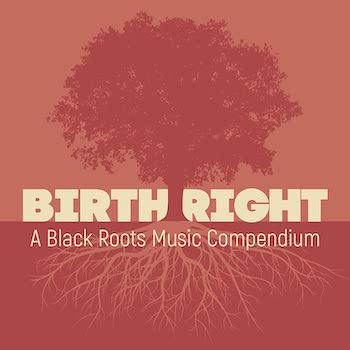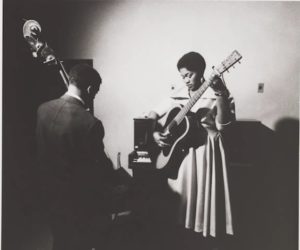Album Review: A Past Fit for the Future –“Birthright: A Black Roots Music Compendium”
By Jeremy Ray Jewell
Projects such as Birthright: A Black Roots Music Compendium extricate the resilient voice of the people from the cacophony of current ideological intervention.
 The current politicization of America’s racial history obscures one of its most important facts: that it is old. On one hand, we find what Ben Vinson III has called “the perpetual newness of Black history”, whereby shifting sands of theoretical orientation preempt our understanding of America’s racial past in a trustworthy way. The need to feed the beast of all-encompassing, paradigm-shattering revisionism has led to inaccuracies and weakened the overall project of improving Americans’ awareness of their shared history. On the other hand, we encounter populist anti-intellectualism against the straw man of critical race theory.
The current politicization of America’s racial history obscures one of its most important facts: that it is old. On one hand, we find what Ben Vinson III has called “the perpetual newness of Black history”, whereby shifting sands of theoretical orientation preempt our understanding of America’s racial past in a trustworthy way. The need to feed the beast of all-encompassing, paradigm-shattering revisionism has led to inaccuracies and weakened the overall project of improving Americans’ awareness of their shared history. On the other hand, we encounter populist anti-intellectualism against the straw man of critical race theory.
Both sides seem to have a common bone to pick with the theoretical excesses of today’s intelligentsia. That is a point worth exploring. Yet as Governor Ron DeSantis signed Florida’s new “Stop WOKE” act, promising that it would not impact the state’s required teaching of Black history, he failed to mention that Florida educators have already been admonishing the state for three decades for failing to fulfill that mandate. That is the material danger of such perpetual newness.
Last month Craft Recordings released Birthright: A Black Roots Music Compendium. The collection provides a survey of American Black roots music, covering a wide range of genres and generations in 40 songs. American roots music expert Ted Olson, who produced the collection with Scott Billington, writes in his introduction that the purpose of the album is to “honor an established if often overlooked canon of recording” and “to introduce that canon to new generations.” It arrives at an opportune time, as a new generation comes of age with questions of Black history loudly echoing from the halls of political and academic power in terms with very minimal resonances inside the Black community itself. In times of uncertainty, the wise look to tradition for guidance
A number of the tracks here can be regarded as canonical. Banjoist Dink Roberts’ “Fox Chase” comes from a series of recordings done in the ’70s at his Haw River, NC home. To some, Roberts represents a musical missing link to Black banjo styles pre-dating recording technologies. There is also Lesley Riddle, friend and collaborator of foundational country music act The Carter Family. Martin, Bogan & Armstrong were once, in part, the act known as the Tennessee Chocolate Drops which recorded in the legendary 1929/1930 Knoxville Sessions. Their rendition here of jazz standard “Sweet Georgia Brown” by Harlem Renaissance composer Maceo Pinkard may serve to open up many ears to the Black string band music tradition. Old-time fiddler Joe Thompson appears in a previously unreleased track, “Georgia Buck”, accompanying the current generation of Black string bands which he mentored, the Carolina Chocolate Drops. As for the blues, there are essential recordings from Etta Baker, Fred McDowell, Skip James, Lonnie Johnson, John Lee Hooker, John Hurt, Jesse Fuller, Rev. Gary Davis, and Lightnin Hopkins – names any introduction to the blues should feature.

Odetta and bassist Bill Lee. Photo: courtesy of Craft Recording.
Of course, New Orleans, the birthplace of jazz, features prominently by way of tracks from the Preservation Hall Jazz Band and the Dirty Dozen Brass Band. Louisiana’s unique contributions are also represented through George Lewis, Clifton Chenier, Alphonse “Bois Sec” Ardoin (cousin of Amédé Ardoin), and Canray Fontenot. In his essay for the collection (to which he also contributed musically), Corey Harris describes the singularity of New Orleans. With its distinct Latin racial ideologies, enslaved Africans were permitted to drum in that city’s Congo Square at a time they were prohibited to do so in anglophone cultures in the Americas. This ban was strictly enforced after the Haitian Revolution of 1791, which began with a drum-lead ceremony at Bois Caïman. . Slave owners knew that the drums could be used to coordinate actions across large distances.
Harris describes New Orleans as “at the border between the Deep South and the Caribbean, having more in common with Haiti and Martinique than Pittsburgh or Cincinnati.” It is a salient observation that has resonances beyond Louisiana. It makes one wonder whether space might be found in this canon for Haitian méringue, Puerto Rican bomba, Afro-Mexican son jarocho, Cuban changui, or Colombian cumbia. It could be argued that these fall outside the scope of the borders of today’s USA (excluding bomba). Birthright does, however, include Bahamian Joseph Spence and a cover of Trinidadian Neville Marcano by Leyla McCalla: could this be the first stirrings of a transnational diasporic canon, perhaps?
It is worth noting some of the issues plaguing our understanding of Black culture today might be illuminated with reference to the past. Today’s questions of cultural borrowing and authenticity obscure the principle of vox populi, vox dei which was an essential part of Black American music. Today, debates about bona fides abound, with debates over who is an “industry plant” and who comes “out the mud” constituting a near moral panic among devotees who once believed the hip-hop world to be a meritocracy. Curiously, this shift is happening just as Black capital begins to supplant white capital at the industry’s core.
Looking at tradition may be a way to construct consensus. To know where you are going, or even where you are, you must know where you have been. As G.K. Chesterton wrote, tradition “is the democracy of the dead” — it is often our best fail-safe against tyranny. T.S. Eliot would later suggest that “the past should be altered by the present as much as the present is directed by the past.” Either way, the past is indispensable. Enthusiasts of Black American music might also want to take note of how musicians in the broader diaspora — because they were not dedicated to constant innovation from commercialization or fighting hostile appropriation — managed to preserve traditions. But we’re not quite there yet.
Harris praises the universality of this musical canon by describing how it transcends the mechanized clamor and demeaning superficiality of today’s hyper-commercialism: “Black roots music is a testament to the fact that if modern civilization were to collapse, we have the power and the spirit to rise up once again. We only need to hold on to our roots.” Perhaps the collapse of modern civilization is too optimistic. Still, projects such as Birthright extricate the resilient voice of the people from the cacophony of past and current ideological interventions — the pseudo-intellectualized and the anti-intellectual — to present an inspirational vision of the past. Once recovered, it becomes a space we can occupy, if briefly. Listening to the drums of Congo Square or Bois Caïman in that small space may just be enough.
Jeremy Ray Jewell writes on class and cultural transmission. He has an MA in history of ideas from Birkbeck College, University of London, and a BA in philosophy from the University of Massachusetts Boston. His website is www.jeremyrayjewell.com.
Tagged: Birthright: A Black Roots Music Compendium, Corey Harris, Craft Recordings
